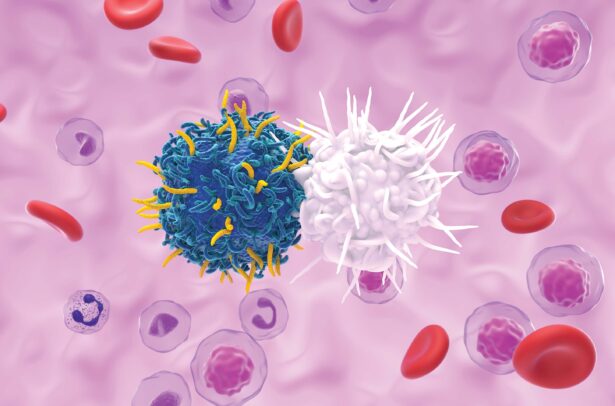Innovations: CAR-T Discoveries
Vanderbilt-Ingram pioneers new CAR-T discoveries and treatments
January 14, 2025

Remarkable. That’s how Bhagirathbhai Dholaria, MD, described responses to an ongoing clinical trial for patients with relapsed or refractory multiple myeloma who had run out of treatment options.
Dholaria, associate professor of Medicine, presented interim results from the Phase 1 trial for a new “off-the-shelf” chimeric antigen receptor-T cell (CAR-T) therapy at the 21st International Myeloma Society Annual Meeting in Rio de Janeiro on Sept. 27, 2024. CAR-T is an immunotherapy that the Food and Drug Administration first approved for a type of leukemia in 2017, but Vanderbilt-Ingram Cancer Center hematologists were already providing it to patients. They pioneered the treatment through clinical trials and remain at the vanguard of this revolutionary immunotherapy.
CAR-T is a treatment in which a patient’s T cells are harvested, reengineered in a laboratory to attack cancer cells, and then infused back into the patient’s body. It was revolutionary at the time it was developed because CAR-T is a once-and-done, single-treatment therapy, but CAR-T discoveries have just begun. An “off-the-shelf” treatment option — engineered from healthy donors’ T cells instead of a patient’s own T cells — would expedite the manufacture of this immunotherapy and make it readily available, allowing patients to start treatment sooner. The FDA has not yet approved an “off-the-shelf” or allogeneic CAR-T therapy, but Vanderbilt-Ingram researchers are once again leading the way.
The FDA has approved six CAR-T autologous therapies, which are made from a patient’s own T cells, for lymphomas, leukemias and multiple myeloma. Other clinical trials are underway to potentially expand their approvals, and Vanderbilt-Ingram is offering them to patients who meet the medical protocols.
The FDA has given the therapy for which Dholaria presented interim data, P-BCMA-ALL01, designation as a regenerative medicine advanced therapy through the 21st Century Cures Act to accelerate development.
P-BCMA-ALL01 demonstrated a 91% overall response rate for the 23 patients participating in the optimized dose cohort with multiple myeloma who had not responded to existing treatments or who had relapsed disease. Vanderbilt-Ingram accrued the most participants of the study’s 15 sites.
“The high overall response rate of 91% is remarkable because most study participants in my center had rapidly proliferative refractory disease in contrast with those treated in the pivotal clinical trials of FDA-approved autologous CAR-T therapies,” Dholaria said. “Such patients treated in the current trial of P-BCMA-ALL01 would not have qualified for standard of care autologous CAR-T therapy. All patients in the Phase 1 trial have been treated quickly once enrolled with no waiting for manufacturing and with no need for apheresis or bridging therapy, demonstrating key advantages of allogeneic CAR-T cell therapy.”
Dholaria is part of a team of physicians at Vanderbilt-Ingram who are CAR-T experts. Collectively, they are conducting several clinical trials for potential new CAR-T therapies. The trials include another potential “off-the-shelf” therapy that also involves an emerging medical treatment called CRISPR. This is a gene-editing technology that allows scientists to precisely cut and insert DNA into the human genome.
Olalekan Oluwole, MD, MPH, associate professor of Medicine, is the investigator for this Phase 1 clinical trial involving CRISPR and CAR-T, which is called ANTLER. It is offered to patients with relapsed/refractory B cell non-Hodgkin lymphoma who meet the trial criteria. Oluwole also pioneered an outpatient treatment protocol for CAR-T at Vanderbilt-Ingram that other cancer centers are implementing. When the first cancer patients in Tennessee underwent CAR-T therapy at Vanderbilt-Ingram in 2015, they had to be hospitalized for an extended period and closely monitored for serious reactions. He and colleagues demonstrated that patients could receive CAR-T liberated from a hospital room.
In 2017 Vanderbilt also pioneered CAR-T treatment for pediatric cancer patients in Tennessee. Carrie Kitko, MD, Ingram Professor of Pediatric Oncology and associate professor of Pediatrics, began offering it for a subset of pediatric acute lymphoblastic leukemia patients. At the time, Vanderbilt was one of only 32 health care institutions in the U.S. certified to offer the therapy.
Other physicians on the CAR-T team are Eden Biltibo, MD, MSCI, Andrew Jallouk, MD, PhD, Adetola Kassim, MD, Reena Jayani, MD, MSCI, James Jerkins, MD, Bipin Savani, MD, and Richard Ho, MD, MSCI.
No Comments »
No comments yet.
